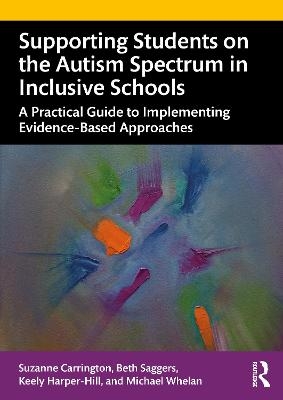
Supporting Students on the Autism Spectrum in Inclusive Schools
Routledge (Verlag)
978-0-367-50174-7 (ISBN)
This book addresses the urgent need to identify inclusive educational environments and strategies for students on the autism spectrum so that they have the best chance of social, behavioural, and academic success at school. Teachers who include students on the autism spectrum in primary and secondary classrooms require greater knowledge of how they can best support the learning, social, and behavioural needs of their students. Without such knowledge, the consequences can include unsatisfactory learning experiences for all students, and interrupted schooling for the student on the autism spectrum through reduced attendance and retention, lower academic performance, exclusion, disengagement, and pressure on parents to make alternative arrangements for their child’s education.
Inclusive education is socially, emotionally, and academically beneficial for all students and positively impacts on respectful attitudes to difference. This book presents innovative, evidence-based practices that will build the capacity of teachers and specialists implementing an inclusive and contextually relevant approach to education that will support students on the autism spectrum and meet the diverse needs of all students in their classrooms.
Suzanne Carrington is a Professor in education at QUT Australia. She has over 25 years of experience working in universities in teaching, research, international development, and senior leadership roles. Suzanne’s areas of expertise are in inclusive education, ethical leadership, and disability impacting on policy and practice in Australian and international contexts. Beth Saggers is an Associate Professor in the School of Early Childhood and Inclusive Education at QUT Australia. Keely Harper-Hill is the Research Associate for the Enhancing Learning and Teaching education research program of the Autism CRC at QUT Australia. Michael Whelan is an Associate Professor in the School of Creative Practice at QUT Australia. He is also a writer, musician, and autism advocate.
Part 1 – Introduction. 1. Moving from a special education model to an inclusive education model: Implications for supporting students on the autism spectrum in inclusive settings – An evidence-based approach. Part 2 – Inclusion and school connectedness: A whole-school approach. 2. School connectedness to support student mental health and wellbeing. 3. How to implement a whole-school approach to school connectedness. Part 3 – Enhancing teaching and the learning experience in the classroom: Impact on educational practice for students on the autism spectrum. 4. Inclusive teaching for students on the autism spectrum. 5. Models of Practice for teachers of students on the autism spectrum. 6. Using structured teaching strategies in mainstream classrooms: Research to practice. 7. Sound amplification in school contexts: Implications for inclusive practice. Part 4 – Transition to life after school. 8. Post-school transitions: Supportive strategies informed by real-life experiences. 9. Boosting post-school outcomes: Supporting adolescents on the autism spectrum to feel ready for life after school. 10. A creative strengths-based post-school transition project for young adults on the autism spectrum: Super Conductor and the Big Game Orchestra. Part 5 – Conclusion. 11. Summary and propositions.
| Erscheinungsdatum | 07.05.2021 |
|---|---|
| Zusatzinfo | 7 Tables, black and white; 2 Line drawings, black and white; 26 Halftones, black and white; 28 Illustrations, black and white |
| Verlagsort | London |
| Sprache | englisch |
| Maße | 174 x 246 mm |
| Gewicht | 340 g |
| Themenwelt | Medizin / Pharmazie ► Medizinische Fachgebiete ► Psychiatrie / Psychotherapie |
| Sozialwissenschaften ► Pädagogik ► Sonder-, Heil- und Förderpädagogik | |
| ISBN-10 | 0-367-50174-0 / 0367501740 |
| ISBN-13 | 978-0-367-50174-7 / 9780367501747 |
| Zustand | Neuware |
| Informationen gemäß Produktsicherheitsverordnung (GPSR) | |
| Haben Sie eine Frage zum Produkt? |
aus dem Bereich


